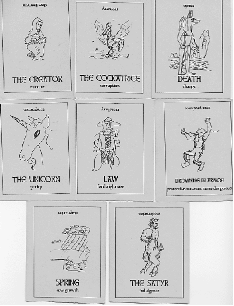 |
|
 |
||||||
Religion: |
||||||
The Southern Baptist Convention is the largest Protestant denomination in the US. The Southern Baptists came into being in 1845 when the Baptist church split up over the issue of whether it's cool for Christians to own, sell, and exploit other Christians (or other people in general). The Southern Baptists are, historically, the "pro-slavery Baptists." More recently, they're the ones whose leaders have said, for example, that God doesn't hear the prayers of Jews and that Mohammed was a demon-possessed pedophile. This year [2002], Bush praised the Southern Baptist Convention for its tradition of tolerance. (And people say Clinton had a hard time with the truth.) Speaking of tradition, the Southern Baptists are slowly but surely throwing out their fundamental tradition of "soul competence," the idea that a believer has the capacity to interpret Scripture without a religious leader defining a creed to be followed. The Southern Baptist Convention adopted a statement of Baptist Faith and Message in 1925. While this statement is intended not to be a creed but simply a summary of Biblical truth, it includes extra-Biblical tenets, such as monogamy and inerrancy. Lately, SBC leaders have caused a controversy in the church by revising the Baptist Faith and Message and for asking missionaries to affirm their agreement to it. One of these changes was the statement that a "wife is to submit herself graciously" to her husband, and it was this conservative movement in the church that led Jimmy Carter to distance himself from the SBC. It seems that soul competence was all well and good when it undermined the Catholic claim to fame (spiritual authority). But once too many souls were competent enough to interpret Scripture in ways that the conservative leaders didn't like, soul competence became a liability. Creeds have always been a fine expedient for church leaders seeking to expand or protect their power, and I guess it's to the Southern Baptists' credit that it took this long for soul competence to get sacrificed at the altar of 19th century orthodoxy. For you philosophers following along at home, the Baptist Faith and Message addresses the sticky issue of whether God knows ahead of time whether an individual will end up in Heaven or Hell, or do we each have the free will to make choices that determine our destinies. The BFM's answer is Yes. Unlike the Mormons, the Southern Baptists have the good fortune not to have exalted any of their 19th century theology to the status of holy writ. The idea of soul competence was a big help in this area. Thus Southern Baptists have less reason to be chagrined by the things that their 19th century leaders said and wrote than the Mormons do.
—JoT top |
||||||